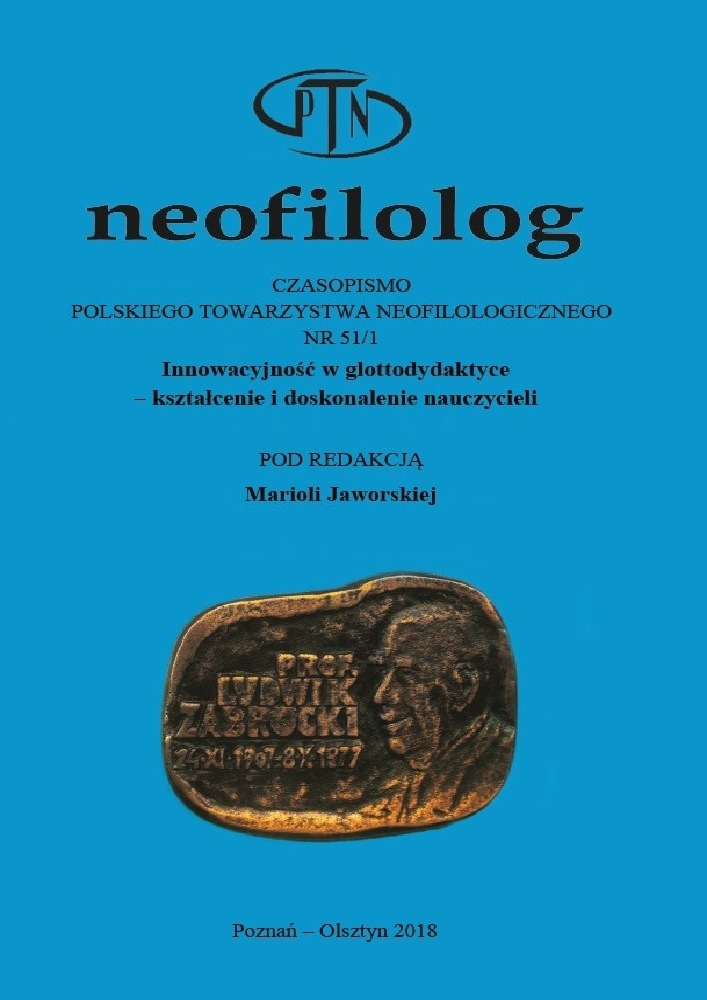Abstrakt
Innovation in language education, just as in any other discipline, is connected with changes whose primary goal is to make the process of language learning/language teaching more efficient. Examples of such innovations include, for instance, task based instruction, computer assisted language learning or the use of portfolio as a means of assessment.
Innovation implies a new, qualitatively different perception of the language learning/ language teaching process, roles of teachers and learners, use of materials etc., hence it is believed to constitute a challenge for language teachers and their professionalism. The present article is an attempt to answer the question whether and to what extent the language teaching profession is actually prepared to deal with innovation.
Bibliografia
Carless, D. 2013. „Innovation in language teaching and learning”. (w:) The Encyclopedia of Applied Linguistics. (red. C. A. Chapelle). DOI: 10.1002/9781405198431.wbeal0540.
England, L. 1998. „Promoting effective professional development in English Language Teaching (ELT)”. English Teaching Forum, vol. 36, no 2: 18-23.
Komorowska, H. 1999. „Successful teaching: How to achieve it, how to assess it”. Network, vol. 2, no 2: 3-9.
Komorowska, H. i Kiely, R. 1998. „Quality and impact – the evaluation agenda”. (w:) Innovations and outcomes in English language teacher education. (red. P. J. Melia). The British Council, Poland: The PRINCE Project, s. 15-38.
Markee, N. 1997. Managing curricular innovation. New York: Cambridge University Press.
Markee, N. 2001. „The diffusion in innovation in language teaching”. (w:) Innovation in English language teaching. A reader. (red. D. R. Hall i A. Hewings). London: Routledge, s. 118-126.
Schleicher, A. 2016. Educating for innovation and innovation in education. http://oecdeducationtoday.blogspot.com/2016/09/educating-for-innovation-and innovation.html.
Schratz, M. 2013. What is a “European teacher”? A discussion paper. European Network on Teacher Education Policies (ENTEP). http://www.see-educoop.net.education_in/pdf/workshop/tesee/documenti/european-teacher.pdf. DW 05.05.2013.
Schulz, R. 1994. Twórczość pedagogiczna. Warszawa: Instytut Badań Edukacyjnych.
Sergeant, S. 2001. „CALL innovation in the ELT curriculum”. (w:) Innovation in English language teaching. A reader. (red. D. R. Hall i A. Hewings). London: Routledge, s. 240-249.
Smak, E. 1997. Z zagadnień innowatyki pedagogicznej. Opole: Wydawnictwo Uniwersytetu Opolskiego.
Ur, P. 1997. „The English teacher as professional”. English Teaching Professional, July, Issue 8: 3-5.
Widdowson, H. G. 2004. „A perspective on recent trends”. (w:) A history of English language teaching. (A. P. R. Howatt i H. G. Widdowson). Oxford: OUP, s. 353-372 (chapter 21).
Zawadzka, E. 2004. Nauczyciele języków obcych w dobie przemian. Kraków: Oficyna Wydawnicza „Impuls”.
Licencja
Prawa autorskie (c) 2019 Krystyna Droździał-Szelest

Utwór dostępny jest na licencji Creative Commons Uznanie autorstwa – Bez utworów zależnych 4.0 Międzynarodowe.
Przedstawiany utwór (artykuł) upubliczniany jest na podstawie umowy z autorem i na licencji Creative Commons Attribution-NoDerivatives 4.0 International (CC BY-ND 4.0).
Użytkownicy mają obowiązek podania wraz z rozpowszechnionym utworem, informacji o autorstwie, tytule, źródle (odnośniki do oryginalnego utworu, DOI) oraz samej licencji;
- bez tworzenia utworów zależnych,
- utwór musi być zachowany w oryginalnej postaci.
Uniwersytet im. Adama Mickiewicza w Poznaniu zachowuje prawo do czasopisma jako całości (układ, forma graficzna, tytuł, projekt okładki, logo itp.).

